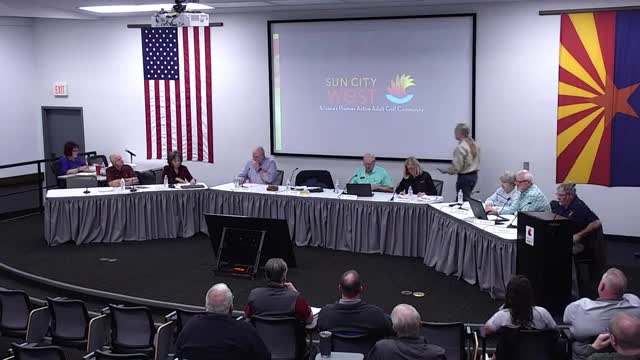Attorney memo: RCSCW cannot unilaterally make PURA membership mandatory; board to consider recommendation at regular meeting
Get AI-powered insights, summaries, and transcripts
Subscribe
Summary
The governing board reviewed a corporate‑attorney opinion that the Recreation Centers of Sun City West cannot require owner‑members to join the Sun Cities area advocacy group PURA or collect a mandatory $15 fee. The board discussed options and will place a final decision on the regular meeting agenda.
Governing board President Leary told the Jan. 10 workshop that he had requested legal guidance after a recent PURA request that the association make PURA membership mandatory and collect a proposed $15 per person annual fee from all owner‑members.
President Leary read excerpts from a four‑page opinion prepared by the association’s corporate attorney, James Hazelwood, concluding that the Recreation Centers of Sun City West (RCSCW) "cannot be involved in a request to fund expressly or tacitly a mandatory PURA membership fee for all residents through dues." The attorney said RCSCW is a planned community association under Arizona law with mandatory membership and assessments that arise from recorded declarations and facility agreements running with the land.
Hazelwood’s memo noted that PURA was established in 1983 as a voluntary organization and was not given express authority to assess owner‑members. The memo also cited Arizona case law, including the Dreamland Villa litigation and Calibra Ranch precedent, which emphasize notice and consent requirements for converting voluntary clubs into mandatory assessments. "Moreover, such an amendment almost certainly would not occur today without 100% owner approval," Hazelwood wrote, as changes affecting mandatory obligations typically require unanimous owner action in this context.
President Leary summarized four possible courses of action: do nothing; petition owner‑members to amend declarations to create mandatory PURA membership (requiring 100% approval); ignore the precedent and proceed (with expected litigation risk); or deny PURA’s request. Leary said his recommendation to the board is to deny PURA’s request and to not hold a March referendum as PURA requested.
Directors acknowledged the value of PURA’s government‑relations work but also emphasized legal limits on the association’s authority. Several audience members and public commenters urged exploration of contingency plans—such as creating an association committee or other mechanisms to maintain government relations should PURA’s voluntary revenues decline—but board members said those options require further study and cannot be acted on at the workshop.
After discussion, the board agreed to place the matter on the regular meeting agenda for a final vote. President Leary said option 4 (deny PURA’s request) was his recommendation for the board to consider at that meeting.
Ending: The attorney memo and board discussion make clear that RCSCW lacks authority to unilaterally make PURA membership mandatory. The board will consider a final vote at its next regular meeting.
